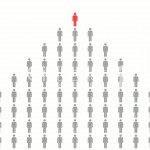 In recent years there has been an undeniable shift towards a more egalitarian workplace, with philosophies such as Holocracy espousing a more meritocratic environment whereby status is conferred less by your place in the hierarchy as your talents and abilities.
In recent years there has been an undeniable shift towards a more egalitarian workplace, with philosophies such as Holocracy espousing a more meritocratic environment whereby status is conferred less by your place in the hierarchy as your talents and abilities.
Whilst it’s tempting to think that status doesn’t matter in such an environment, a recent study highlights how even if we’re not bothered by a fancy job title or even a huge salary, it’s kind of inbuilt within us as humans to crave a degree of social status.
Is a desire for status inherently human?
The researchers, from Berkeley-Haas, conducted an extensive review of the literature around the topic of status, and found that it is usually something people covet, even if they do so unconsciously.
“I usually study the sexy angle of power and confidence but with this one, it’s about everyone. Everyone cares about status whether they’re aware of it or not,” the authors say.
The paper goes on to suggest that status is largely a universal desire, and plays a significant role in how we both behave and think.
“Establishing that desire for status is a fundamental human motive matters because status differences can be demoralizing,” they say. “Whenever you don’t feel valued by others it hurts, and the lack of status hurts more people than we think.”
For instance, this desire for status could be linked with things such as prestige or reputation, or could even play a major role in how we perceive ourselves and our overall levels of psychological wellbeing.
The research saw analysis of papers stretching back over the past 70 years of study in this area. The first step of the analysis was to define status such as to distinguish it from similar constructs such as financial success and even power. As such, the paper eventually defined status as having three distinct elements to it:
- respect and/or admiration
- deference by others
- social value (or prestige)
The second stage of the research then saw the literature explored to better understand what makes a motive inherently fundamental to us as humans. To establish whether a desire for status fulfilled that need, the researchers used four core criteria.
- Wellbeing and health, ie did the attainment of status contribute to our physical and psychological health
- Does the desire for status drive our behaviour? In other words, are our behaviours and habits tied to the desire to obtain status, and underline our reactions when our status is threatened?
- Is our desire for status self contained? In other words, do we desire status for the sake of status rather than any extra motives?
- Is the desire a universal one? Does it apply across different genders, cultures, personalities and ages?
Does low status affect our health?
The authors suggest that the strongest test of their hypothesis is to understand if low status has a negative impact upon our health. Their analysis revealed that people with low status, whether in their workplace, community or even peer group, tended to suffer more with depression, anxiety and cardiovascular disease.
This was also true for individuals who suffered a fall in their status. Such individuals tend to feel less valued and respected by their peers, with a greater likelihood of being ignored by others.
The authors hope that their findings will prompt more research into the topic, especially as status is an increasingly important issue in the workplace.
“The desire for status can drive all kinds of actions, ranging from aggression and violence, to altruism and generosity, to conservation behavior that benefits the environment. The more we understand this basic driver, the more we can harness it to guide people’s decisions and actions to more productive paths,” they conclude.
How important is status to you, either at work or in your personal life?
Yes, I think we do. It's a natural part of who we are as human beings.